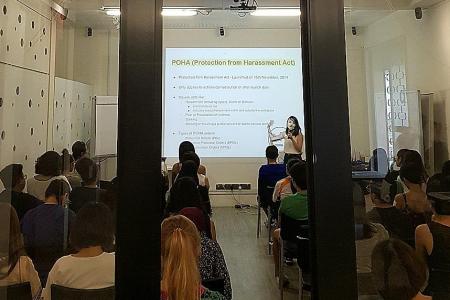High demand for training to respond to sexual assault survivors
Slots for the session, the first one this year, were filled in just over an hour
On June 12, the Association of Women for Action and Research (Aware) held its sexual assault first responder training (SAFRT) public session for the first time this year, and all slots were filled in just over an hour - the fastest since since the training debuted in 2019 - with 50 people left on the waitlist.
The session, which is designed to equip participants with skills to provide sensitive and non-judgmental support to sexual assault survivors, is Aware's most popular training programme, with up to 200 people on the waitlist in previous sessions.
Over 50 participants were engaged in the recent three-hour Zoom session, which discussed the definition and recognition of sexual assault, how to respond to someone who has been sexually assaulted and how to refer them to appropriate resources for further help.
Ms Rayann Condy, 41, SAFRT's lead trainer, told The New Paper: "The high demand shows there is a growing awareness that sexual violence is both a serious and complex issue that requires nuanced consideration and conversation."
Aware's Sexual Assault Care Centre dealt with 967 new cases of sexual assault last year, a 24 per cent increase from the 777 cases in 2019. Ms Condy said how a first responder acts will have a "massive impact" on the survivor's recovery journey.
She said: "It is really hard for survivors to speak out and get help for a variety of reasons, including the knee-jerk victim-blaming response that so many people give when they hear an account of sexual assault.
"For example, someone might say, 'But why didn't you fight back?' or 'Maybe you misunderstood his meaning?', which, intentionally or not, serves to diminish and undermine the survivor's experience.
"(But) if it is a supportive and compassionate response, they are likely to seek further assistance, such as counselling, or make a police report."
Since the SAFRT programme was open to the public in 2019, about 20 sessions have been held with over 1,000 participants. Due to the pandemic, sessions were held via Zoom last year and over 400 people signed up.
According to Aware, on average, 15 per cent of the participants are male.
Ms Condy said while men are in the minority, Aware needs the support of male feminist allies.
Dance artist Bernice Lee, 34, who attended a session in 2019, told TNP: "I hoped to gain a broad understanding of how sexual violence functions in our society, how to respond to and support someone who has suffered from sexual violence, and the legal framework in Singapore - and I was not disappointed."
She added: "Many of the ideas can also be helpfully applied to different situations where somebody is distraught or traumatised, and in need of a good listener."
Get The New Paper on your phone with the free TNP app. Download from the Apple App Store or Google Play Store now


